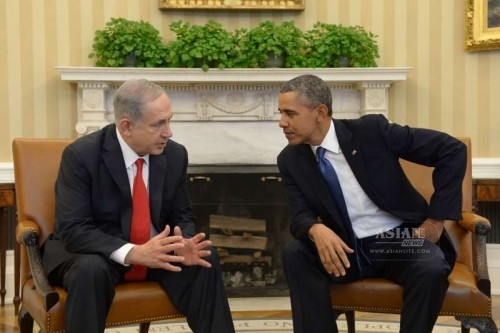
By Arun Kumar
US President Barack Obama and Israeli Prime Minister Benjamin Netanyahu took pot shots at each other as the latter warned against entering a “very bad” deal with Iran over its nuclear programme.
“This is a bad deal – a very bad deal. We’re better off without it,” he said in a defiant speech before a joint session of Congress Tuesday on a trip that has raised White House’s hackles.
Directly challenging Obama’s argument that a diplomatic accord would be more effective than additional sanctions or military action, he said any agreement that stops short of completely dismantling Tehran’s nuclear programme would be ineffective.
“The alternative to this bad deal is a much better deal” not war, Netanyahu said drawing frequent applause from lawmakers from both chambers controlled by the Republicans.
But about 50 members of Obama’s Democratic Party skipped the speech calling it an insult to Obama.
Republican speaker John Boehner invited Netanyahu to share his viewpoint with the US Congress without any reference to the White House straining ties between the two allies as also their leaders.
Hours later, Obama who has declined to meet the premier on this trip ostensibly not to appear to take sides in the Israeli election due in two weeks, said Netanyahu had offered no “viable alternatives” to nuclear talks with Iran.
Speaking in the Oval Office alongside Defence Secretary Ashton Carter, Obama said he didn’t watch the speech, but had skimmed over Netanyahu’s remarks and found “there was nothing new”.
Netanyahu made almost the same speech when he warned against the interim deal reached with Iran, he said. But that deal has resulted in a freeze and rolling back of Iran’s nuclear programme.
Netanyahu’s alternative to the talks, Obama said amounts to no deal at all and that would lead Iran to redouble efforts to build a nuclear bomb.
“So the bottom line is this: We don’t yet have a deal. It may be that Iran cannot say yes to a good deal,” he said asserting that he “would rather have no deal than a bad deal”.
“But if we’re successful in negotiating, then, in fact, this will be the best deal possible to prevent Iran from obtaining a nuclear weapon.”
“Nothing else comes close. Sanctions won’t do it. Even military action would not be as successful as the deal that we have put forward,” the president said.
Obama said he “thoroughly agreed” with Netanyahu’s observation “that the bond between the United States of America is unbreakable” and “it is very important for us not to politicice the relationship between Israel and the United States”.
But “it’s very important for all of us Americans to realise that we have a system of government in which foreign policy runs through the executive branch and the president, not through other channels”, he said questioning Boehner’s invitation to Netanyahu.
The New York Times in an editorial agreed calling “Netanyahu’s Unconvincing Speech to Congress exploitative political theatre” intended to challenge Obama’s foreign policy.
“Even Washington doesn’t often see this level of exploitative political theatre; it was made worse because it was so obviously intended to challenge President Obama’s foreign policy,” it said.
The Washington Post acknowledged that concerns about a prospective nuclear agreement with Iran raised by Netanyahu are not new, but said Obama nevertheless “needs to provide real answers to Netanyahu’s arguments”.
“Netanyahu’s arguments deserve a serious response from the Obama administration – one it has yet to provide,” it said noting “The White House has sought to dismiss the Israeli leader as a politician seeking re-election”.